Revamping the communication reliability of SCADA systems in photovoltaic plants project report.
Introduction:
As an engineering student specializing in photovoltaic technology, I have been exploring the challenges faced in ensuring reliable communication in SCADA systems within photovoltaic plants. SCADA systems play a crucial role in monitoring and controlling various processes in a photovoltaic plant, and any disruptions in communication can have a significant impact on the overall efficiency and performance of the plant. In this project, I will be focusing on proposing solutions to improve the communication reliability in SCADA systems in photovoltaic plants.
Problem Statement:
One of the primary issues faced in SCADA systems in photovoltaic plants is the reliability of communication. The existing systems often face disruptions and downtime, leading to inefficiencies in monitoring and controlling the plant operations. This not only affects the overall performance of the plant but also poses safety risks and can result in financial losses. It is crucial to address these communication reliability issues to ensure the smooth and efficient operation of photovoltaic plants.
Existing System:
The current communication system in photovoltaic plants typically relies on wired connections for transmitting data between the various components of the SCADA system. While wired connections are generally reliable, they can be susceptible to physical damage, such as cutting or corrosion. Additionally, wired connections can be expensive to install and maintain, especially in large-scale photovoltaic plants spread across vast areas.
Disadvantages:
- Prone to physical damage
- Expensive installation and maintenance costs
- Limited scalability in large-scale plants
- Potential disruptions leading to downtime
- Increased safety risks and financial losses
Proposed System:
To address the communication reliability issues in SCADA systems in photovoltaic plants, I propose the implementation of a wireless communication system. Wireless communication offers several advantages over wired connections, including increased flexibility, scalability, and cost-effectiveness. By implementing a wireless communication system, we can ensure reliable data transmission between the various components of the SCADA system, reducing the risks of disruptions and downtime.
Advantages:
- Increased flexibility in installation
- Cost-effective deployment and maintenance
- Improved scalability for large-scale plants
- Enhanced reliability in data transmission
- Reduced risks of disruptions and downtime
Features:
The proposed wireless communication system will be designed to meet the specific requirements of SCADA systems in photovoltaic plants. Some key features of the system include:
- Real-time data transmission for monitoring and control
- Secure and reliable communication protocols
- Scalability to accommodate the growing needs of the plant
- Remote access for monitoring and maintenance
- Integration with existing SCADA systems
Conclusion:
In conclusion, improving communication reliability in SCADA systems is essential for optimizing the performance of photovoltaic plants. By implementing a wireless communication system, we can overcome the limitations of the existing wired connections and ensure seamless data transmission between the various components of the SCADA system. The proposed system offers several advantages, including increased flexibility, scalability, and cost-effectiveness. It is crucial to invest in innovative solutions like wireless communication to enhance the efficiency and reliability of photovoltaic plants in the future.

